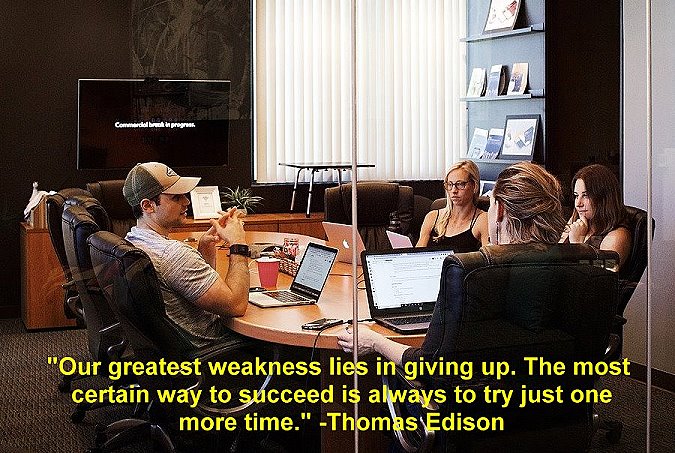
How Often Should You Follow Up in Sales?
It takes reach and frequency to close a sale. Frequency as in ‘follow up.’
There are a number of ways to do sales follow up. Only 3% of your market is ready to buy now.
40% are ready to begin. One third to one half will buy from the first vendor to respond, so follow up and often!
You need to stay vigilant. Marketing Donut says 83% of prospects who request info don’t buy for 3–12 months. And only 2% of sales happen at the first meeting.
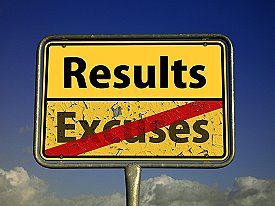 But it’s the age-old question is sales: How many times do you need to follow up in sales?
But it’s the age-old question is sales: How many times do you need to follow up in sales?
Most surveys will tell you we’re not doing it enough.
Have you ever heard the phrase, “People will buy from you if they know, like and trust you.”?
Sometimes it takes a while.
But first, I think you need to have a very good idea of who your BEST prospects are, the solutions they are looking for and where you can engage them.
92% of sales pros give up after the 4th call, but 80% of prospects say no four times before they say yes. Share on XHow to Network Like a Pro
- Identifying your target audiences (and there are usually more than 1)
- The needs or solutions being sought by each target audience
- Where those target audiences hang out and how they can be engaged
 Before you can follow up with them, you have to meet with them.
Before you can follow up with them, you have to meet with them.
Networking is participating in chambers of commerce, Meetups, leads groups and social organizations locally. So can speaking on a local or national level or creating webinar funnels or email campaigns.
When it’s time to do a sales follow up with qualified leads, you can and should do that in a variety of ways.
Developing a Business Networking Plan
A business networking plan must include your objectives: Positioning, Relationships, Branding or Sales. Your objectives may be different for different personas.
Start by evaluating your current efforts. Where are you networking? How much time do you devote to networking? How do you measure the results of your efforts?
How can you improve?
Professional Networking Tips
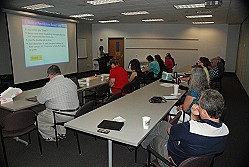 I used to host a Meetup and one of the guest speakers was an expert in the importance of follow up in sales.
I used to host a Meetup and one of the guest speakers was an expert in the importance of follow up in sales.
Dave Ritter from NetworkedChicago suggested following up with someone you meet at an event at least 3 times – probably even more. Not just a phone call or email – INVITE them to your office. MEET them for coffee. ARRANGE to meet them at another event.
Attending these events can be productive, but consider hosting these events, speaking at these events or looking to contribute with a guest blog post for even bigger impact and ROI.
It’s possible to build relationships using social media, and what you’ll learn in this article can be applied to social, but the opportunity to meet face to face has its advantages too!
Dave, who helps professionals and business owners succeed with business development and partnerships. said…
“Effective networking is one of the most valuable business skills a professional can possess. It has been proven time after time that people buy from people they trust and believe in. That’s why so many successful professionals are good at networking. They find the best opportunities for sales (and jobs) this way.”
But he repeated the importance of following up!
How to Network Like a Pro
Most people like to buy, but they do not like being sold. So the key is building quality relationships with your targeted prospects. It can take time, sometimes a year or more.
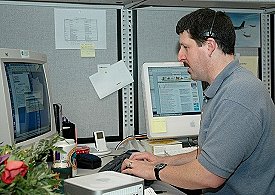 I bet many of your competitors don’t invest the time, which will give you an advantage.
I bet many of your competitors don’t invest the time, which will give you an advantage.
Networking allows you to better understand the solutions your prospects are looking for and identifying the groups they participate in gives you the third piece of the targeting puzzle – where do they hang out?
- Leads & Referral Groups
- Facebook Groups
- Professional Networking Groups
- Speed Networking Groups
- Chambers & Business Associations Groups
- Community Organizations (Lions, Masons, Kiwanis, Toastmasters, Church)
- Online Forums
- Geo-centric Groups
- Alumni Groups
- Professional Associations
- Affinity Groups
- Job Search Groups
- Business & Personal Training
- Meetups
Keep in mind that you network to find customers and make sales, but it can also help building relationships with people who can refer you to prospects, including members of the groups listed above and former or current clients.
Your efforts may be driven by your need for speed (transactional) or the desire to create long term opportunities. Or a combination of both.
It is also important to understand groups and the outcomes you might prefer. Targeting Diverse vs. Homogenized groups is based on your target personas and the funnels you have designed for them.
Dave’s presentation included this slide to help visualize groups. Where will you find your best opportunities?
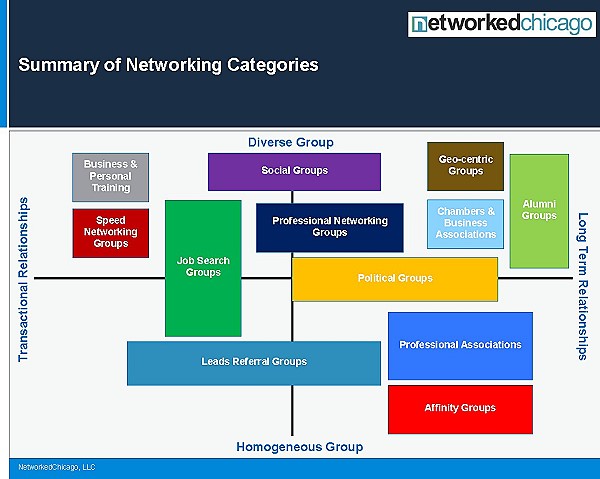
Sales Follow Up
Advertisers and marketing executives have talked about ‘Reach & Frequency’ for decades. Sometimes it takes multiple exposures for people to even become aware of an offer. Some won’t prioritize it initially. Sometimes they are aware of you and your offer, but they are trying to decide of they like you or trust you.
Those are important considerations with every sales follow up; your reputation or street cred. You need to communicate all the benefits and features of your product or service too.
How Many Times to Follow Up in Sales?
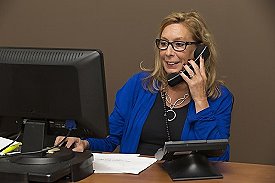 When I was in radio, we talked about how important it was for people to hear an ad 7 or 8 times because it took that amount of exposure before most people were willing to buy. We even had a computer that would calculate that station-by-station, daypart-by-daypart.
When I was in radio, we talked about how important it was for people to hear an ad 7 or 8 times because it took that amount of exposure before most people were willing to buy. We even had a computer that would calculate that station-by-station, daypart-by-daypart.
The Guerrilla Marketing Handbook by Jay Conrad Levinson talks about the various stages of a buyers journey, from barely registering the impression or offer, to dismissing it, to thinking about it as a ‘someday’ option to making the purchase. Finally after 22 exposures, the prospect will buy!
What’s interesting about this is that the piece was written in the 1850s! 170 years ago.
Those were the old days of advertising. ‘Reach and frequency.‘ It still applies today. Frequency also means follow up. Generally, we don’t do it enough.
There are more ways to follow up sales prospects. As you can see from the follow up sales statistics below, successful sales people follow up on a regular basis over months sometimes.
Don’t under-estimate the power of a follow-up. For those you never meet in-person, email marketing can be effective if done right. In fact, follow-ups are the most important emails in your whole campaign.
People seldom feel like acting after the first touchpoint. In fact, surveys show as many as 80% of deals require at least five touches before closing. Admittedly, not all of those touches are emails, but your email outreach should be at least two of those five touchpoints.
You have a 21% chance of receiving a reply to your second email if you don’t get a response to your first one. This is a 20% chance successful deal lost if you never send that follow-up.
The best time to contact a lead? Thursdays from 4-6pm or 5 minutes after their inquiry, according to LeadResponseManagement. Share on XSales Follow Up Statistics
What is the best way to follow up with a prospect? What medium should you use? How many follow ups are enough?
 Accenture says 42.5% of sales reps take 10 months or longer to become productive enough to contribute to a company’s sales goals.
Accenture says 42.5% of sales reps take 10 months or longer to become productive enough to contribute to a company’s sales goals.
How can you speed that up? What tactics and techniques would you teach? What controls would you put in place?- HubSpot says salespeople only spend 33% of their day talking with prospects.
What else are they doing? Email (21%), Data Entry (17%), Prospecting & Researching Leads (17%), Internal Meetings (12%), Scheduling Calls (12%) - 41.2% of salespeople say the telephone is the most important sales tool.
Furthermore, according to gong.io, successful salespeople dominate phone conversation, speaking 54% of the call. Unsuccessful salespeople spend an average of just 42% of their time speaking. - It takes 18 calls to actually connect with a buyer.
How many are you making? - Email marketing has one of the highest marketing ROIs in business; 3700-4200% (2 times higher than cold calling)
Yet, another survey shows telephone outreach has a higher conversion rate: 8.21% to .03% - Less than 1 in 4 (24%) of sales emails are opened.
Yet, email is 40x more effective than either Facebook or Twitter at new customer acquisition. - Surveys say less than 50% of your prospects are a good fit for what you sell.
Are you targeting the right people? - 60% of customers say ‘no’ four times before saying ‘yes.’
- 33-50% of sales go to the vendor who responds first.
- 80% of sales require 5 follow up calls.
Did you know that 44% of sales people give up after ONE sales follow up call? And some high-growth organizations say they need an average of 16 touch points per prospect.
It’s very apparent that sales people need to follow up more than they have been. Again, 50% of sales come after the 5th touch, but the average sales rep only makes 2 attempts tp reach a prospect and 44% give up after one sales follow up.
The medium you use may be different for different target audiences. And a mix of tactics might work better than using just one.
My recommendation? Test them!
Where can you learn to become better at sales?
More than half of sales people surveyed say they depend on their peers for improvement. 44% looked to their manager. 35% say team training. 24% credit media, including YouTube. There are plenty of books, courses and videos on the subject. Jeffrey Gitomer, author of The Sales Bible and The Little Red Book of Selling is one of my favorites.
Biggest Challenges to Effective Sales Follow Up
Most sales people (42%) say their biggest challenge is establishing urgency. Many sales people use some form of FOMO (Fear Of Missing Out) to create urgency.
- “Sale ends Sunday!”
- “Only 2 left in stock!”
- “Buy today and you’ll receive these bonuses.”
Online countdown timers can be very effective too. They can even be included in emails.
The Importance of Follow Up in Sales
In conclusion…
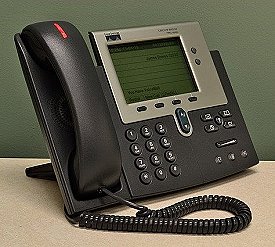 Most people are not ready to buy from you now. Ultimately, they might if they know, like and trust you. A good sale follow up strategy is to get them to know you better and respects your offer.
Most people are not ready to buy from you now. Ultimately, they might if they know, like and trust you. A good sale follow up strategy is to get them to know you better and respects your offer.
That takes time. There are multiple ways to educate and endear you and your solutions to them: the phone has been popular, nothing beats face-to-face. Social media, especially using video is becoming very effective.
Don’t take no for an answer.
Try and learn as much as you can about selling.
Always try one more time.


 Accenture says 42.5% of sales reps take 10 months or longer to become productive enough to contribute to a company’s sales goals.
Accenture says 42.5% of sales reps take 10 months or longer to become productive enough to contribute to a company’s sales goals.